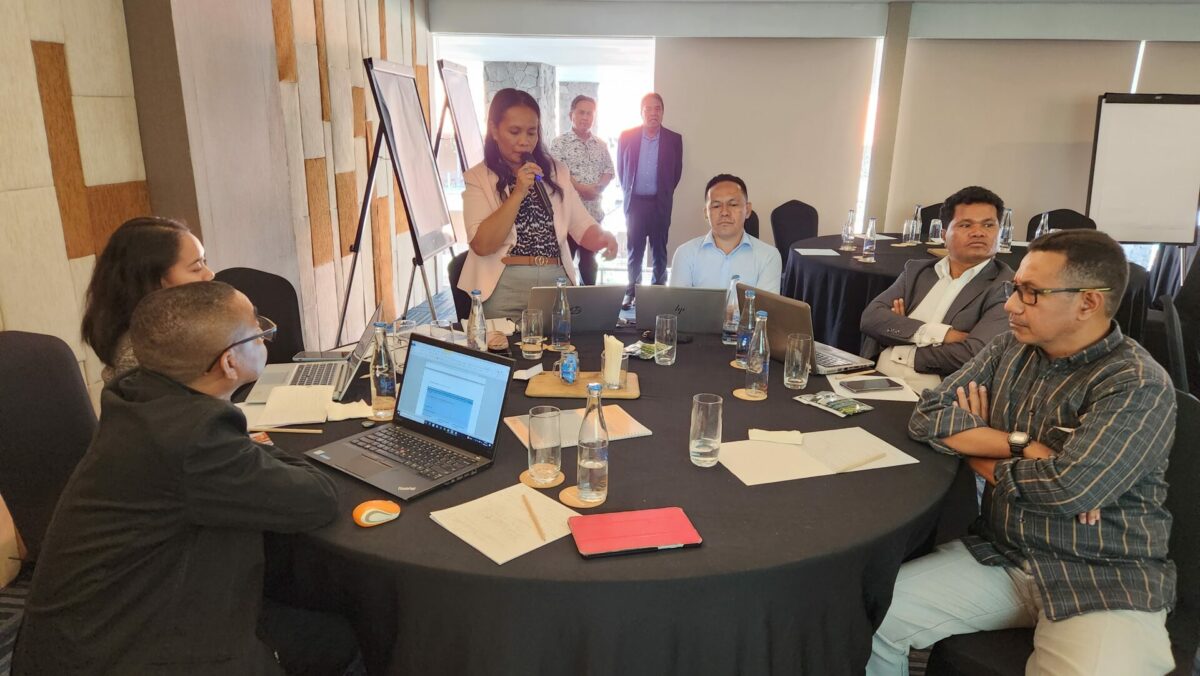In an effort to promote sustainable development and address pressing regional challenges, a Regional Strategic Planning Workshop was held in Bali, Indonesia on 30 and 31 May 2023. The offline workshop brought together approximately 35 key stakeholders, including ATSEA-2 National Project Directors, members of the Regional Working Group, representatives from the United Nations Development Programme (UNDP) Indonesia, the Executive Director of PEMSEA, regional consultants for Strategic Action Plan (SAP) Updating and SAP Financial Planning, as well as members of the ATSEA-2 regional and national project teams. The workshop aimed to refine activities and establish a regional consensus on the SAP framework, with the ultimate goal of paving the way to a more sustainable future.
The Regional Strategic Planning Workshop in Bali had three main objectives: first, refining the draft SAP framework and content; second, securing agreement on the SAP format and presentation; and third, the completion and endorsement process. Throughout the workshop, participants engaged in meaningful discussions and collaborated to achieve these objectives.
“In our discussions, I hope we can keep in mind our long-term vision of a healthy, resilient and productive ATS that supports human well-being and nature”, said Aimee Gonzales, the Executive Director of PEMSEA, in her opening remarks at the workshop. She went on to reiterate that the meeting should focus on the “key targets, actions and activities (intended for inclusion in) the 10-year SAP that will bring us closer to this vision.”
Iwan Kurniawan, the permanent project representative from UNDP Indonesia, drew participants’ attention to a number of key milestones on the horizon that are connected to the SAP. As he explained, “I look forward with great anticipation to the completion of the updated SAP draft, its review during the RSC Intersessional Meeting in July 2023, its finalisation and endorsement in the 5th RSC Meeting in November 2023, and its formal adoption through a new Ministerial Declaration in 2024.”
Yayan Hikmayani, National Project Director of Indonesia, highlighted the country’s commitment to meeting these goals, while emphasising the significance of aligning strategic issues and priority actions with national concerns and strategic programs. “By harmonising these aspects,” Hikmayani explained, “we can strengthen our country’s dedication to implementing the SAP and National Action Program (NAP) in future initiatives, demonstrating our unified commitment to sustainable development.”
“We look forward to refining and validating our national inputs on the SAP framework and content,” added Noan Pakop, National Project Director of Papua New Guinea, who also looked ahead to the workshop activities with a sense of optimism. “This collective endeavour will ensure a more comprehensive and effective plan that resonates with the diverse needs of our region,” he added.
Acacio Guterres is the National Project Director of Timor-Leste. He also conveyed his country’s resolute stance on embracing the SAP and the mechanisms for progress outlined therein. “In our forthcoming role as the host of the Ministerial Forum,” Guterres declared, “we have already strategised to adopt the SAP, NAP, and RGM; despite many challenges, we are committed to convincing and inspiring our government and partners to join us in this transformative journey toward sustainability.”

One of the workshop’s highlights was the generation of additional inputs and consensus on the draft SAP Framework. This involved the creation of a revised, simplified and focused framework, which identified key components, operational objectives and priority actions. Furthermore, participants provided valuable inputs on the SAP structure format, style and presentation, including a dedicated section on cross-cutting issues.
An important suggestion emerged from the workshop, calling for the development of an information package that could serve as a link between the SAP, Regional Governance Mechanism (RGM) and financing. This would offer a valuable resource to governments, by providing guidance and reference points in their sustainability efforts.
To ensure the successful completion of the updated SAP, participants reached an agreement on the remaining steps, timelines and the roles and responsibilities of various stakeholders. This forward-looking approach was utilised in order to maintain momentum and facilitate the timely implementation of the SAP.
Following the workshop, the Regional Working Group and the Regional Project Management Unit are set to review the updated SAP exposure draft. This critical review process will ensure the document aligns with the collective vision established during the workshop. Subsequently, the completion of the first Draft Updated SAP will mark an important milestone in the progress of sustainable development for the ATS region. Finally, the first draft of the SAP will be presented to the Regional Steering Committee (RSC) during an inter-sessional meeting in July 2023, further solidifying their commitment to regional sustainability.
By Ni Luh Putu Yulia Dewi


